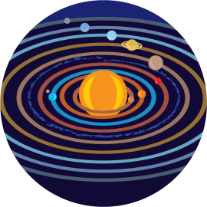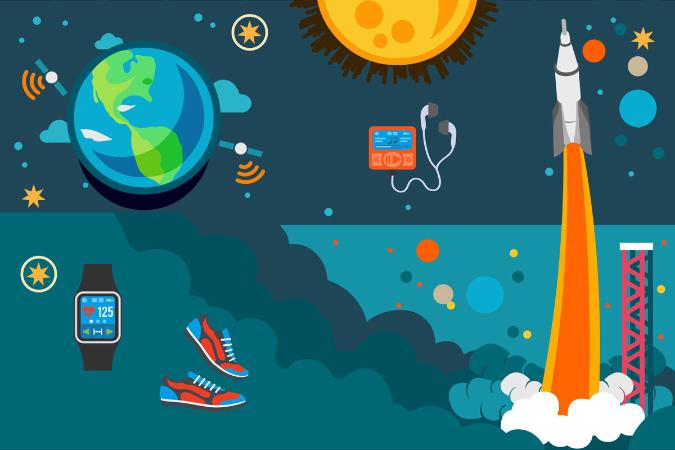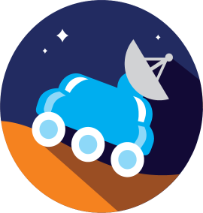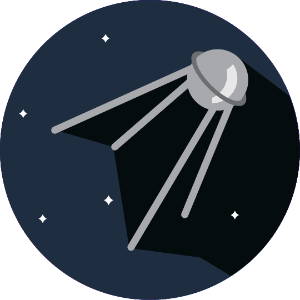
Career Options for the Future Space Scientist
Impact on Daily Life | Contributions from Space | Current Issues in Space Science | Where Can Space Scientists Work | Job Outlook | Space Science Jobs of Future
Career Options for the Future Space Scientist
For centuries, space science and exploration consisted of what astronomers could observe with telescopes from Earth. However, the past 60 years of scientific, engineering and technological advancements has dramatically changed the nature of space science. While a job as an astronaut symbolizes what most people think of a career in space science, reality is that space science is a diverse, multidisciplinary subject that includes nearly every scientific discipline as well as a broad collection of specialties.

Space Scientists Impact Daily Life
The human race has a common origin that transcends insignificant differences like gender, race, ethnicity and religion. In understanding these things, we plan a future for the human race that is technologically advanced and able to solve the problems associated with such things as resource sustainability, overpopulation, global warming and national security.
This understanding also improves our quality of life with products of convenience and technologies that impact our daily lives from cell phones and MRI scans to GPS traffic management and weather forecasts. And even though research and exploration take years to produce results, the astounding human benefits from scientific knowledge and technological advances end up being as important as the original mission of discovery.
Scientists have learned a lot about earth from studying space. The result of decades of scientific, engineering and technological advancement is a workforce of theorists, critical thinkers, problem solvers and analysts who fill a myriad of jobs in a myriad of industries, all dedicated to the exploration and innovation that changes the world.
By Definition, Space Science is the Study of the Universe, Galaxy, Solar System and Our Home Planet.
 It encompasses a range of topics including cosmology, astrophysics, astronomy, planetary science and astrobiology. It is the science that aims to construct a comprehensive understanding of our cosmic origins and of life elsewhere in the universe, whether it is extraterrestrial in origin or humans exploring our solar system and beyond. It goes beyond pure scientific fields in areas such as engineering, mathematics and information technology because so many of the complex questions and problems of our time demand experts in a myriad of disciplines.
It encompasses a range of topics including cosmology, astrophysics, astronomy, planetary science and astrobiology. It is the science that aims to construct a comprehensive understanding of our cosmic origins and of life elsewhere in the universe, whether it is extraterrestrial in origin or humans exploring our solar system and beyond. It goes beyond pure scientific fields in areas such as engineering, mathematics and information technology because so many of the complex questions and problems of our time demand experts in a myriad of disciplines.
Contributions From Space
Here are some out of this world innovations from space.
Infrared Ear Thermometers
The same technology that once measured the temperature of distant stars and planets now measures the temperature of humans in a hand-held, high-speed device.
Wireless Headset
Inspired by the technology that Neil Armstrong used to speak to Mission Control from the moon, mobile headsets continue to evolve in all forms of communication.
Solar Energy
High-performance, economical, solar-powered equipment in homes and businesses around the world is possible because of space science.
Water Purification
Interested in controlling microbial contamination in space, NASA created the effective methods we now use to control water pollutants on Earth.
Shock Absorbing Athletic Shoes
Using material originally developed for Apollo space missions, today’s shoes use this material to absorb and redistribute energy for more comfort and performance.
Sport Heart Rate Monitors
Astronaut heart monitoring technology was modified for use in physical fitness equipment to track exercise intensity.
Cell Phone Camera
Scientists at NASA’s Jet Propulsion Laboratory gave us the ability to take pictures on our phone.
Temper Memory Foam
Aimed at comfort and safety in aerospace vehicle seats, temper foam is now a protective cushion in sports gear, footwear, prosthetics, body-conforming mattresses and pillows.
Find more space science spinoffs here.
Current Issues in Space Science
From missions to Mars to spinning stars, there are numerous issues impacting space science right now.
The Early Universe
Huge high-energy particle colliders continue to push our understanding of the universe to earlier and earlier times, and we may soon start seeing signs of “super symmetry” between nuclear processes.
The Spinning Star Problem
Simple calculations show that as a star forms from a cloud of gas it should spin faster and faster until it breaks apart. However, when stars form they somehow overcome this problem. It could be that some of the rotational energy goes into planets, some of the mass of the system is lost, that there is a drag effect from a galactic magnetic field, or that many different effects slow the rotation. The continued study of young stars will begin to narrow down these explanations.
Galaxy Formation and Evolution
While our understanding of the early universe continues to improve, we are yet to see into the “dark ages” when the first stars turned on and galaxies formed. The James Webb Space Telescope will allow us a first look at this part of cosmic history.
Abiogenesis and Extraterrestrial Life
We have found complex molecules are common in space and are found on asteroids and comets in particular. How these molecules then go on to become the biological material necessary for life to start (abiogenesis) is an ongoing area of study. Coupled to this is the “are we alone?” question. With luck, the upcoming James Webb Space Telescope may be able to detect the signatures of life in planets around other stars using the “transit spectroscopy” method.

Missions to Mars:
 Humans do not yet know how to live sustainably on Earth. A crewed mission to Mars will bring together and inspire billions of people, create hundreds of thousands of high-tech jobs and sustain our curiosity if not for generations, then into the distant future. By investigating the science behind a mission, building the technology needed, and carrying out the most ambitious adventure our species has ever attempted, we will learn how to sustainably live on a hostile-to-life planet.
Humans do not yet know how to live sustainably on Earth. A crewed mission to Mars will bring together and inspire billions of people, create hundreds of thousands of high-tech jobs and sustain our curiosity if not for generations, then into the distant future. By investigating the science behind a mission, building the technology needed, and carrying out the most ambitious adventure our species has ever attempted, we will learn how to sustainably live on a hostile-to-life planet.
Where Can Space Scientists Work?
Space science drives economies, advances society, predicts the future of our planet and discovers new wonders in the galaxy.
Individuals who choose space science for a career make contributions to health and medicine, information technology, communications, transportation, public safety and the environment. Regardless of their specialty, scientists, engineers and technology professionals whose work concentrates on space help to answer questions about the universe and the many related issues for humankind.
-
Astronauts get the headlines, but in truth they hold few of the jobs in space science. The industry of exploring space generates a wide range of jobs including engineers who design rockets, satellites, space stations, group support equipment, instrumentation and safety equipment. There are also careers in telecommunications, aeronautics, robotics, avionics, radar, computer-aided design and quality assurance.
-
Employment is also found across multiple scientific disciplines in geoscience, biology, chemistry, physics, geology, meteorology and astrophysics. NASA employs roughly 17,000 workers (Bureau of Labor Statistics, March 2016). Outside of space-based agencies like NASA, positions are available with other federal agencies (United States Department of Defense, The Federal Communications Commission and the National Science Foundation) as well as private companies, with a focus on manned space flight, aerospace, research and engineering.
-
NASA’s strategic goals include understanding our cosmic origins and the future of human life on Mars. This means there are significant opportunities for graduates in both the federal and private sectors as this effort moves forward.
-
Federal opportunities arise from research taking place at NASA centers and the research funded through universities. Research scientists and postdoctoral positions are all paths that properly qualified individuals can pursue for careers if they would like to understand both our cosmic origins and future on Mars.
-
The cost of getting to Mars is currently prohibitive. However, a growing amount of space-flight is being carried out by private companies that are finding ways to get to orbit at significantly reduced costs (SpaceX, Blue Origin, Virgin Galactic, Planetary Resources, Bigelow Aerospace, Sierra Nevada Corp., Orbital ATK). Coupled with the role that large contractors like Lockheed Martin and Northrop Grumman, along with the likes of Ball Aerospace and Rockwell Collins play in the development of technology ready for use in space, the future is bright for space sciences graduates.
-
In addition to careers associated with space exploration, career opportunities are available in the study of the atmosphere’s physical characteristics and the ways in which they affect our environment. Forecasting the weather, as well as identifying and interpreting climate trends, air pollution control, agriculture and forestry and the study of global warming and ozone depletion are just a few.
Click here to learn more about which companies hire space scientists.

Job Outlook Through 2024
Click here to learn which jobs are available for space scientist today.
| OCCUPATION | TYPICALLY NEEDED TO ENTER OCCUPATION | PROJECTED JOB OPENINGS THROUGH 2024* |
|---|---|---|
| Scientists | 8,600* | |
| Astronomers | Bachelor’s, Doctoral or Professional Accreditation |
|
| Atmospheric & Space Scientists | Bachelor’s Degree | |
| Physicists & Plasma Physicists | Bachelor’s, Doctoral or Professional Accreditation |
|
| Engineers | 171,900* | |
| Aerospace Engineers | Bachelor’s Degree | |
| Computer Engineers | Bachelor’s Degree | |
| Electronics Engineers | Bachelor’s Degree | |
| Mechanical Engineers | Bachelor’s Degree | |
| Technicians | 44,400* | |
| Aerospace Engineering and Operations |
Associate Degree | |
| Avionics Technicians | Associate Degree | |
| Meteorological Technicians | Associate Degree | |
| Media and Communications | 145,800* | |
| Technical Writers | Bachelor’s Degree | |
| Public Relations Specialists | Bachelor’s Degree | |
| Producers and Directors | Bachelor’s Degree | |
| Photographers | Long-term Industry Training/ Experience |
* For more information, visit The Bureau of Labor Statistics.
Space Science Jobs of the Future
As technology advances, jobs in space science will expand to new and exciting roles.
 BATTERY ENGINEER—advancing energy for everything from personal devices, hybrid cars, cloud computing and space travel.
BATTERY ENGINEER—advancing energy for everything from personal devices, hybrid cars, cloud computing and space travel.
 SPACE PILOT—Fly shuttles to space in 2020 when Virgin Galactic plans to launch the first commercial suborbital spaceflights as space tourism kicks into gear.
SPACE PILOT—Fly shuttles to space in 2020 when Virgin Galactic plans to launch the first commercial suborbital spaceflights as space tourism kicks into gear.
 ROBOT DESIGNER & INTERACTION SPECIALIST—As interactive automation continues to grow, savvy engineers and scientists will be needed to design and manage artificial intelligence.
ROBOT DESIGNER & INTERACTION SPECIALIST—As interactive automation continues to grow, savvy engineers and scientists will be needed to design and manage artificial intelligence.
 ANALYSTS OF EVERYTHING—Demand for statistics will swell by 20% by 2018* as business becomes more dependent on data and science is able to predict the future.
ANALYSTS OF EVERYTHING—Demand for statistics will swell by 20% by 2018* as business becomes more dependent on data and science is able to predict the future.
 FABRICATOR OF CARBON FIBER SPACESHIPS AND PLANES Composite structures and new materials are always sought-after commodities in innovative design and engineering environments.
FABRICATOR OF CARBON FIBER SPACESHIPS AND PLANES Composite structures and new materials are always sought-after commodities in innovative design and engineering environments.
 FUSION POWER WORKER—Diagnostic physicist and magnet auxiliary officer might be the titles of jobs in a thermonuclear reactor power plant in 2025. Fusion plants are expected to boom like nuclear power in the ’70s.
FUSION POWER WORKER—Diagnostic physicist and magnet auxiliary officer might be the titles of jobs in a thermonuclear reactor power plant in 2025. Fusion plants are expected to boom like nuclear power in the ’70s.
 DIGITAL DETECTIVES—Cybersecurity is a huge growth area for computer science professionals, touching all aspects of daily life, national defense and space exploration.
DIGITAL DETECTIVES—Cybersecurity is a huge growth area for computer science professionals, touching all aspects of daily life, national defense and space exploration.
 BIOTECH—Scientists in the biotech arena are discovering new medications, engineering organs, uncovering the long-lasting effects of space travel and learning to grow food in foreign environments, setting the stage for a range of future career opportunities.
BIOTECH—Scientists in the biotech arena are discovering new medications, engineering organs, uncovering the long-lasting effects of space travel and learning to grow food in foreign environments, setting the stage for a range of future career opportunities.
Interesting Reads
The 12 Greatest Challenges for Space Exploration
Space Science and Space News
Research Opportunities with NASA Jet Propulsion Laboratory
Discover Magazine Space & Physics Topics
SciTechDaily
NASA Career Opportunities


 Give to Florida Tech
Give to Florida Tech